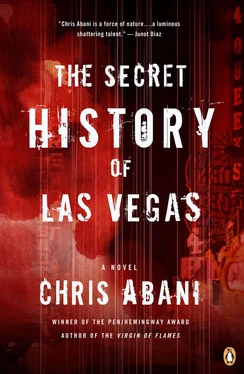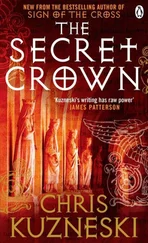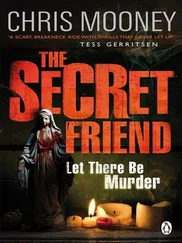Fuck you, Salazar said.
Terry nodded. We’re not likely to find anything soon, he said.
Why not, Salazar asked.
Big lake, Terry said. A lot of undercurrents. The body, if there was one, and with that amount of blood you’d need several, could be in Arizona by now. Or washed up somewhere where the lake meets the river and the river the desert. The desert gives nothing back.
Salazar liked Terry, they went back a ways and Salazar respected that Terry, a beat cop, had taken night classes at UNLV to qualify as a forensic expert. It took guts to go for a thing you wanted, at least that was how Salazar saw it. Still, he thought Terry talked a lot of shit sometimes.
Fuck, Salazar said.
I hear you. But there’s more. There’s no blood on the twins. I mean, if there had been a body, with that much blood, they would be covered in it. Nothing on them, not even a trace. And with all that blood, we would be looking for a lot more than one body.
How many?
Fuck if I know, Terry said.
But it’s definitely human blood?
Yep, Terry said. Very human.
Shit. Could they have at least transported the drums of blood and dumped them here?
Nope. No blood in the car, either, Terry said.
Shit, Salazar said.
I know, Terry said.
They could have washed off in the lake.
Trace would still show up under the black light. There was an awkward pause. You know we have to move on soon, Terry continued.
Why?
Well, there’s no body, so this isn’t an active crime scene, Terry said. Half a five-gallon drum full of human blood is disturbing, but budget cuts and all mean we need an actual body, you know?
Salazar wanted to scream. Instead he said: I have to take the freaks in.
If they lawyer up, you’ll have nothing, Terry said.
Yeah, Salazar sighed. I guess I have to break them. You remember how that goes?
Terry smiled. I sure do, he said. Listen, didn’t you work closely with a psychiatrist a couple of years ago when the bodies first began to turn up? Singh, right? Take the twins to County. Before you go, call Dr. Singh and ask him to meet you at County to perform a psychological evaluation. You’d have them for seventy-two hours.
Salazar smiled. They do look kind of sick, he said.
Shortly after Salazar took the twins, the crime scene crew and the rest of the police left. Even the divers gave up the search for the night. The lakeshore returned to its normal quiet. An animal rustled in the tamarisk. A bird landed on the water. The wind threw some dust from the road onto the foundations of the houses that sat in the mud like the ruins of an ancient culture. On the shore, only the ranger’s truck remained, lights still flashing in the gloom.
The dying sun burnished the copper ingot of the Mandalay Bay. Next to it was the pyramid of the Luxor and, reclining in front, the light catching the gold paint of its headdress, the Sphinx. Farther to Sunil’s left, the Bellagio and the tip of the Eiffel Tower rose above Paris Las Vegas. The Venetian, his favorite, was obscured.
He loved this moment when the sun was on a slow decline, just before the abruptness of night that seemed exclusive to deserts and plains. It reminded him of the light on the South African veld. One moment bright and full, the next, gone. The veld was just like its name, a stubby felt of grass and trees and small hills that seemed to break only when the green and brown rim of it touched the sky.
For one magical summer as a seven-year-old, he’d left Soweto behind on a summer trip to see his grandmother, Marie. She lived in KwaZulu, a homeland — one of those odd geographies created arbitrarily by the apartheid state as all black enclaves within South Africa. Not unlike Native American reservations, homelands were corrals, ways to contain and further impoverish native populations: entire settlements made up of shanties leaning unevenly into the wind.
Grandma Marie lived in the foothills, and as Sunil and his mother, Dorothy, traveled higher into the old Zulu territory, the shanties disappeared. Up there, everything felt different — the pace moved only as fast as the swaying fields of corn, or the lumbering herds of zebu that roamed everywhere, horns curved like arms raised in prayer. Each cow was marked so distinctively, in so many variations of red, white, black, brown, rust, and dun, that from a distance they looked like flocks of birds littering the grass on the hillsides.
The frenetic mood of Soweto seemed then like a bad taste spat from the mouth, and the air smelled fresh and sometimes heavy with rain. There was hardly a white person to be seen, and the blacks were less suspicious of one another. The only anger was the gossip — how Lindiwe Mabena had slept with Blessing Nkosi’s husband a week after she died. How Catechist Brown was never the same after Father John passed, though no one would admit they’d been lovers. How Doreen Duduzile always miscarried because she’d had an abortion as a young woman in Cape Town, and how though she’d renounced the world and followed the Lord, she couldn’t find any respite until she confessed to the murder of her unborn child, but as his mother told Grandma Marie, there are no words for some things. Everything else was pure scent. The smell of the toffees his grandmother pressed into his palms that melted in the heat of his clutched fingers, the drying grass and herd animals that filled the air with dust and delight. And something else — butterflies — everywhere, butterflies. And at dusk, the soft purple pastel of sky blurred into the darkening grass and then, before he could count to a hundred, night.
Sunil knew that his memory was faulty, that it was so tempered by nostalgia it could offer nothing concrete, but that knowledge did nothing to diminish his joy in the recollection.
The sun in his eye brought him back to the moment, to his body standing at the window of his sixth-floor office in the nondescript building in the nondescript business park east of the strip that was home to the Desert Palms Institute. His reflection in the glass made him uncomfortable, the way the honesty of shop windows makes fat women flinch. His hair was kinky and thick like a wool cap — not quite an Afro, but close enough — his nose clearly his mother’s, the soft mouth that he believed he’d inherited from his father, and skin so dark, he could be black. His eyes were the only thing he liked about himself, soft and warm, and honey-colored flecked with green; his father’s eyes, Brahmin eyes, a strange thing for a Sikh, stranger still in an African. Sighing, he took a sip from his coffee cup and focused on the view.
Sunil loved to watch the city from his office window, high up, tracking every little change in the landscape. He knew very well the illusion of chronology, the way it gave the impression that everything moved onward, expanding on a straight line, heading toward epiphany. But events weren’t linear, they moved in circular loops that made little sense, and this disjointed reality was the only truth. Chronology, he believed, was a pattern grafted over the past to claim control and understanding, to pretend meaning. It was all shit, though, in the end. He felt people were made of little more than this: history, myth, and ritual. When he remembered his past, he remembered his father with the distance of myth.
He drew with his forefinger on the glass to connect the hotels with invisible lines, reading some esoteric Masonic notions in the pattern. Even from this far away, he could see the extravagance of it all, an extravagance that was as old as the city itself. A history buff, he knew the Jewish-Irish-Sicilian mob syndicate that built the mirage of Vegas opened grandiose hotels early. In 1952, the Sahara was designed to mimic the movie romanticism of North Africa. In 1955, the Dunes, with waitresses dressed like DeMille extras in an Arabian Nights production, and a thirty-foot-tall turbaned black sultan with crossed arms guarding the doors, appeared almost overnight. And in 1956, in the new Fremont, twelve-year-old Wayne Newton rose to fame singing “Danke Schoen.”
Читать дальше












